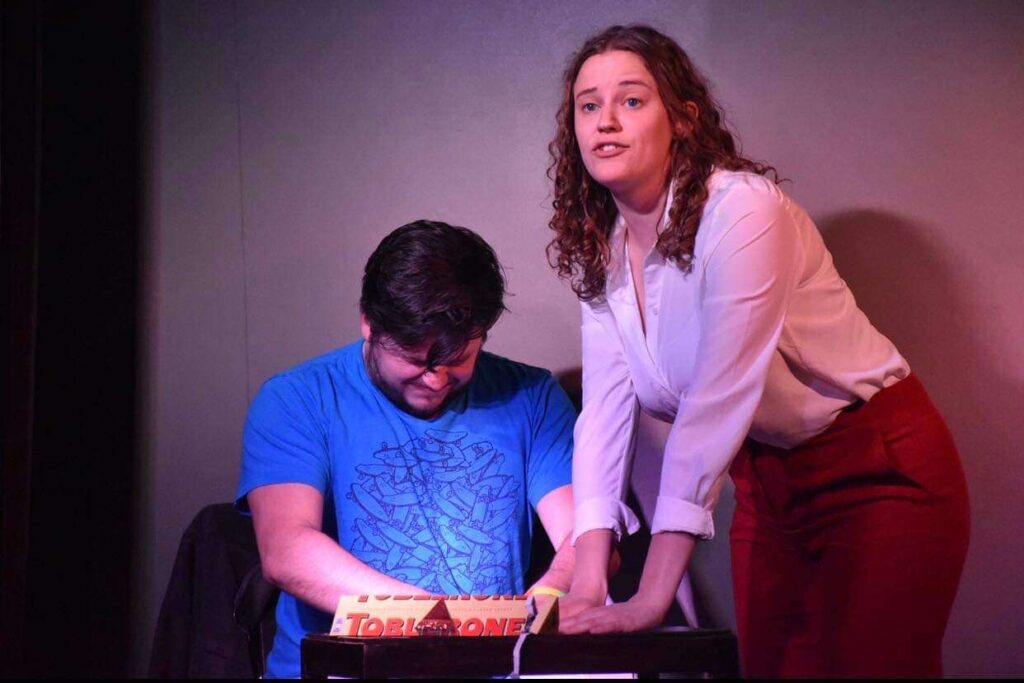
From cheating scandals to unexpected pregnancy, Act One’s latest show did not disappoint
We’ll save you a seat for their next one
Act One, Cardiff Uni’s student drama society, showcased a fantastic production of The Boomerang Effect at Pulse Nightclub: A romantic comedy consisting of five interrelated short plays surrounding five different relationship dynamics and storylines.
The play was set in the bedroom scenario of the five different couples, with a minimal set that was used for effect. It was an effective choice as it provided smooth scene transitions with fitting music choices that worked in the context of the characters.
There is a heart-felt relatability to each couple’s predicaments, with struggles explored that test a couple’s durability in everyday life. Themes of power struggles, miscommunication, infidelity, and sexual incompatibility all surface.
We see the impact of their self-inflicting interferences to their relationships, such as cheating to persistent fault-finding that come back to hit them in the face later on, much like a boomerang. The Boomerang Effect was perfectly explained in the line: “Every decision we make becomes just another link in this needless chain of well-intentioned disasters we call life.” An important message that audiences can take away.

Paul and Stephanie, played by Luke Knights and Libby Kettle, opened the show with a hilarious portrayal of a contrasting “opposites-attract” type of couple. Knights displaying a man-child charisma, relaxed in tone and stance, maintaining a university student lifestyle was matched with an uptight and stressed girlfriend, convincingly portrayed by Kettle. Their scene takes the audience on an emotional rollercoaster, with the climax of an unexpected pregnancy reveal accompanied by a comedically timed Eastenders theme tune, adding to the drama.

Lucie Rhiannon-Williams and Ed Harris took on roles of Andrew and Renee in the following scene, “pillow talk”. The scene began with a jokingly style strip of Renee’s boot, that Andrew played by Harris failed to pull off, a foreshadow of his inability to satisfy his girlfriend. Renee’s love of her boots was comedically compared to an abusive relationship, a love for them despite them torturing her, yet she can’t get enough. In an ironic pillow talk, Rhiannon uses lighted hearted small talk discussing dishwashers and clothes sales at H&M to deep philosophical enquiries about the afterlife, in an attempt to make Andrew last longer in the act.
Next up was David and Nick, acted by Jack Simpson and Joe Tallamy in their scene, “Screbble”. The scene followed a storyline where an obsession with online game “Screbble” caused a drift in the couples relationship. Simpson, who played David, displayed an excellent vocal and physical representation of an addict of the game, with high energy and a fast paced enthusiastic tone. Tallamy, role of Nick, provided a strong contrast to his partner which was effective in creating amusement among audience. His closed-off body language exemplified his lost attraction to his unemployed and game obsessive boyfriend, providing visual explanation to the plot of him cheating on David.

A different relationship dynamic of boss and employee was explored by Sam Gavin-Pitt and Jessica Wray. They showcased strong and purposeful shifts in power status throughout the scene. The tone is set for the scene when Gavin Pitt uses an assertive tone to demand his new employee to sleep with him in order to keep her job. Wray expresses a realistic amount of shock and asserts her growing emotions of anger and rage through increasing volume and facial expressions of fury.
The audience seemed overjoyed to see this role reversal in status play out, with the female employee standing up to her misogynistic cheating boss. The scene upheld the plays light-hearted, romantic comedy tone with Barry Island related jokes as “Barry-Bados”. Additionally, it is kept amusing in tone as whilst Wray’s character sleeps with the boss for the ideal of an office with a window, she passes him on an STD, demonstrating the boomerang effect to ironically give him what he deserves. Morally bad actions receive bad results.

Finally, Chris Holt and Miah Hereford took on the roles of Marcus and Janette, performing a relatable university hook up, after a drunken Wednesday night. Audience involvement occurs with their clothes being scattered around them. Hereford perfectly executed the role of a keen fresher, fitting of the “gap year” stereotype and persistent in tying down her one night stand despite his taken relationship status.
Meanwhile, Holt achieves success in displaying the growing degree of stress that a cheating boyfriend has. The scene is spent with Holt desperately trying to get his necklace back off a girl whose name he repeatedly forgets, providing much comedy. The boomerang effect is realised when the scene ends on Hereford’s proud and confident tone revealing she exposed the cheating scandal to the girlfriend.

Each couple displayed a natural chemistry with compelling portrayals of their different relationship dynamics that was received positively by the audience.









































